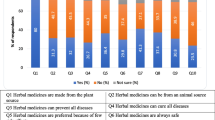Abstract
Objectives
To determine how the Thai elderly perceived the benefits of herbal medicine consumption and to study related variables influencing their perception.
Design
A cross-sectional study was used. Participants/Settings: 419 participants were chosen by systematic stratified sampling; people between 60–96 years of age (mean age 70.2 years); 68.3 % female, and 31.7% male of Chonburi Province (Thailand).
Measurements
To determine the elderly perception about the benefits of herbal medicine consumption, a scale from one to four based upon 12 simply worded item check lists was used among the others. The questionnaires were conducted in June to August 2008 in 3 different regions (urban, suburban and rural areas).
Results
97.4% having used herbal medicines in many ways. Most of the elderly used the local herbals together with conventional medicines. They believed that herbals could reduce expenses (51%), cure diseases (41.9%), relieve symptoms (35.4%), and provide good health (33.6%). A 16.7% of the elderly had the strongest opinion regarding the use of herbal medicines as substitutes for conventional medicines. They also strongly agreed on using them as nutrients (39.8%). The study found significant correlation among levels of education, stress levels, happiness levels, and perception of benefits of herbal medicine consumption.
Conclusions
This study indicated that levels of education, happiness, and stress could influence the perception of herbal medicine consumption. Knowing how people perceive herbal medicine, its use, and local culture can help practicing health professionals, among other things, to avoid side effects from prescriptions and so maintain or promote the elderly health status.
Similar content being viewed by others
References
World Health Organization. World Health report 2003: WHO/HQ Programme on Ageing and Life Course-Developing Integrated Response of Health care System to rapid Population Ageing (INTRA). Bangkok, Thailand: World Health Organization; 2003.
World Health Organization. World Health report 2002:Traditional Medicine strategy 2002–2005. Genewa, Switzerland: World Health Organization; 2002.
Winston D, Maimes S. Adaptogens: herbs for Strength, Stamina, and Stress Relief. Vermont: Healing Arts Press; 2007: 324.
Department of Mental Health, Ministry of Public Health of Thailand. The Thai Happiness Indicator; (THI-15) [in Thai]. Bangkok, Thailand: Ministry of Public Health of Thailand; 2002.
Department of Mental Health, Ministry of Public Health of Thailand. Suanprung Stress Test-20; (SPST-20) [in Thai]. Bangkok, Thailand: Ministry of Public Health of Thailand; 2002.
Mackenzie ER, Rakel B. Holistic Approaches to Healthy Aging. In: Mackenzie ER, Rakel B, ed. Complementary and Alternative Medicine for Older Adults: A Guide to Holistic Approaches to Healthy Aging. New York, NY: Springer Publishing Co; 2006:1–9.
Chan K. Chinese medicinal materials and their interface with Western medical concepts. J Ethnopharmacol. 2005; 96:1–18.
Weiss RF. Weiss’s Herbal Medicine, Classic Edition. 6th ed. New York, NY: Thieme; 2001.
World Health Organization. Regional Consultation on Development of Traditional Medicine in the South East Asia Region report 2005: The Use of Traditional Medicine in the Thai Health Care System. Pyongyang, DPR Korea: World Health Organization (DPR Korea); 2005.
Miller CA. Nursing for Wellness in Older Adults: Theory and Practice. 4th ed. Philadelphia, PA: Lippincott Williams & Wilkins; 2004.
DerMacderderosian A, Brigg M. Supplements and Herbs. In: Mackenzie ER, Rakel B, ed. Complementary and Alternative Medicine for Older Adults: A Guide to Holistic Approaches to Healthy Aging. New York, NY: Springer Publishing Co; 2006:31–78.
Eisenberg DM, Davis RB, Ettner SL, Appel S, Wilkey S, Van Rompay M, Kessler RC. Trends in alternative medicine use in the United states, 1990–1997: results of a follow-up national survey. J Am Med Assoc. 1998;280(18):1569–1575.
Eisenberg DM, Kessler RC, Foster C, Norlock FE, Calkins DR, Delbanco TL. Unconventional medicine in the United States: Prevalence, costs and patterns of use. N Engl J Med. 1993;328(4):246–252.
Mikhail N, Wali S, Ziment I. Use of alternative medicine among Hispanics. J Altern Complement Med. 2004;10(5):851–859.
Eisenberg DM, Kessler RC, Van Rompay MI, Kaptchuk TJ, Wilkey SA, Appel S, Davis RB. Perceptions about complementary therapies relative to conventional therapies among adults who use both: results from a national survey. Ann Intern Med. 2001;135:344–351.
Riewpaiboon A. Increasing herbal product consumption in Thailand. Pharmacoepidemiol Drug Saf. 2006;15:683–686.
Arya PY. Buddhism and Medicine. http://www.tibetanmedicineedu.org/pdf/BuddhMedD1.pdf, Published January, 2006. Accessed September 19, 2009.
Jullamate P, Azeredo Z, Pául C, Subgranon R. Thai stroke Patient Caregivers: Who They Are and What They Need. Cerebrovasc Dis. 2006;21:128–133.
Jullamate P, Azeredo Z, Pául C, Rosenberg E, Subgranon R. Informal stroke rehabilitation: what are the main reasons of Thai caregivers?. Int J Rehabil Res. 2007;30(4):315–320.
Choowattanapakorn T. The social situation in Thailand: The impact on elderly people. International Journal of Nursing Practice. 1999;5:95–99.
Adusumilli PS, Ben-Porat L, Pereira M, Roesler D, Leitman IM. The prevalence and predictors of herbal medicine use in surgical patients. JACS. 2004;198(4):583–590.
Miller JF. Coping with chronic illness. 3rd ed. Philadelphia, PA: F.A. Davis Company; 2004.
urib-Fakim A. Medicinal plants: Traditions of yesterday and drugs of tomorrow. Mol Aspects Med. 2006;27:1–93.
Author information
Authors and Affiliations
Rights and permissions
About this article
Cite this article
Sumngern, C., Azeredo, Z., Subgranon, R. et al. The perception of the benefits of herbal medicine consumption among the Thai elderly. J Nutr Health Aging 15, 59–63 (2011). https://doi.org/10.1007/s12603-011-0013-9
Received:
Accepted:
Published:
Issue Date:
DOI: https://doi.org/10.1007/s12603-011-0013-9



